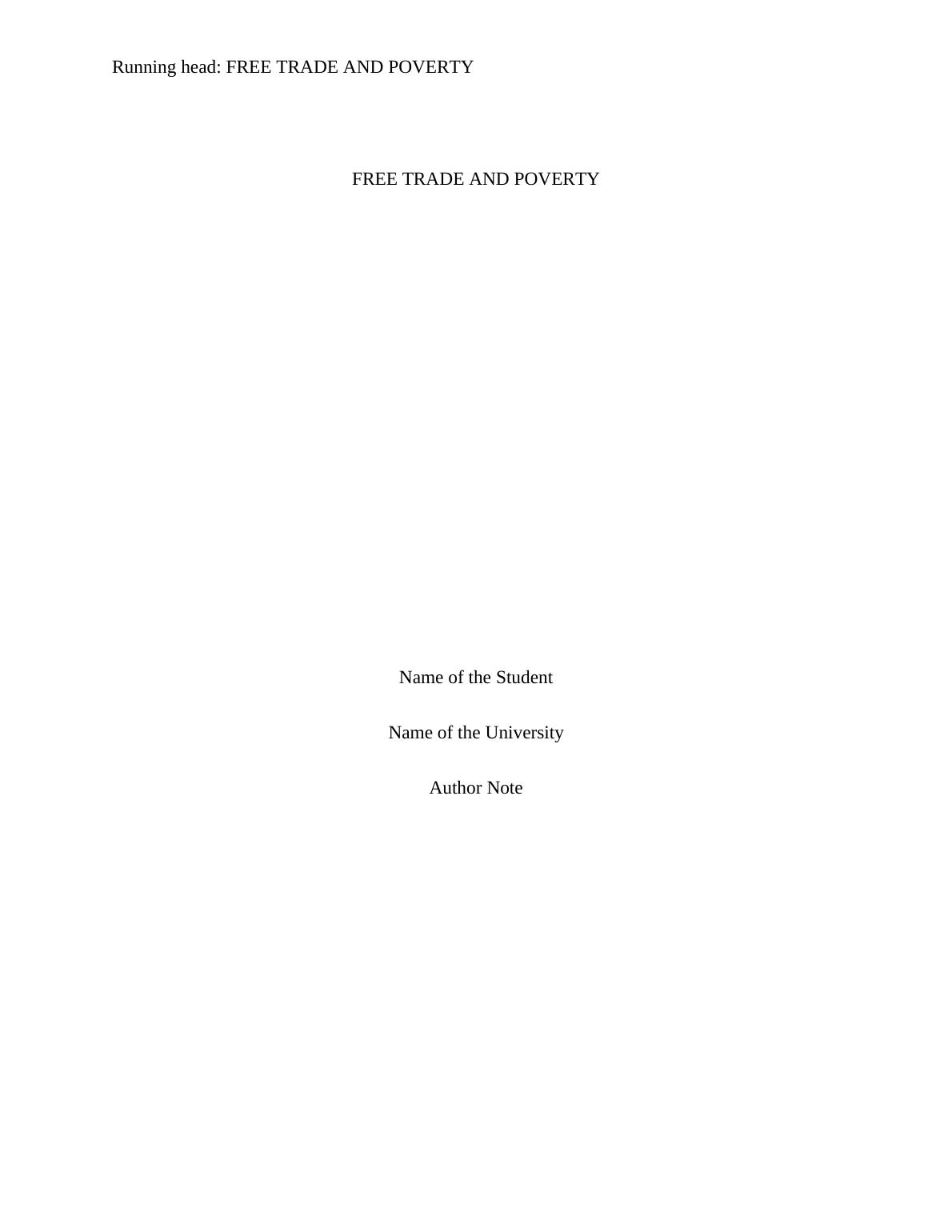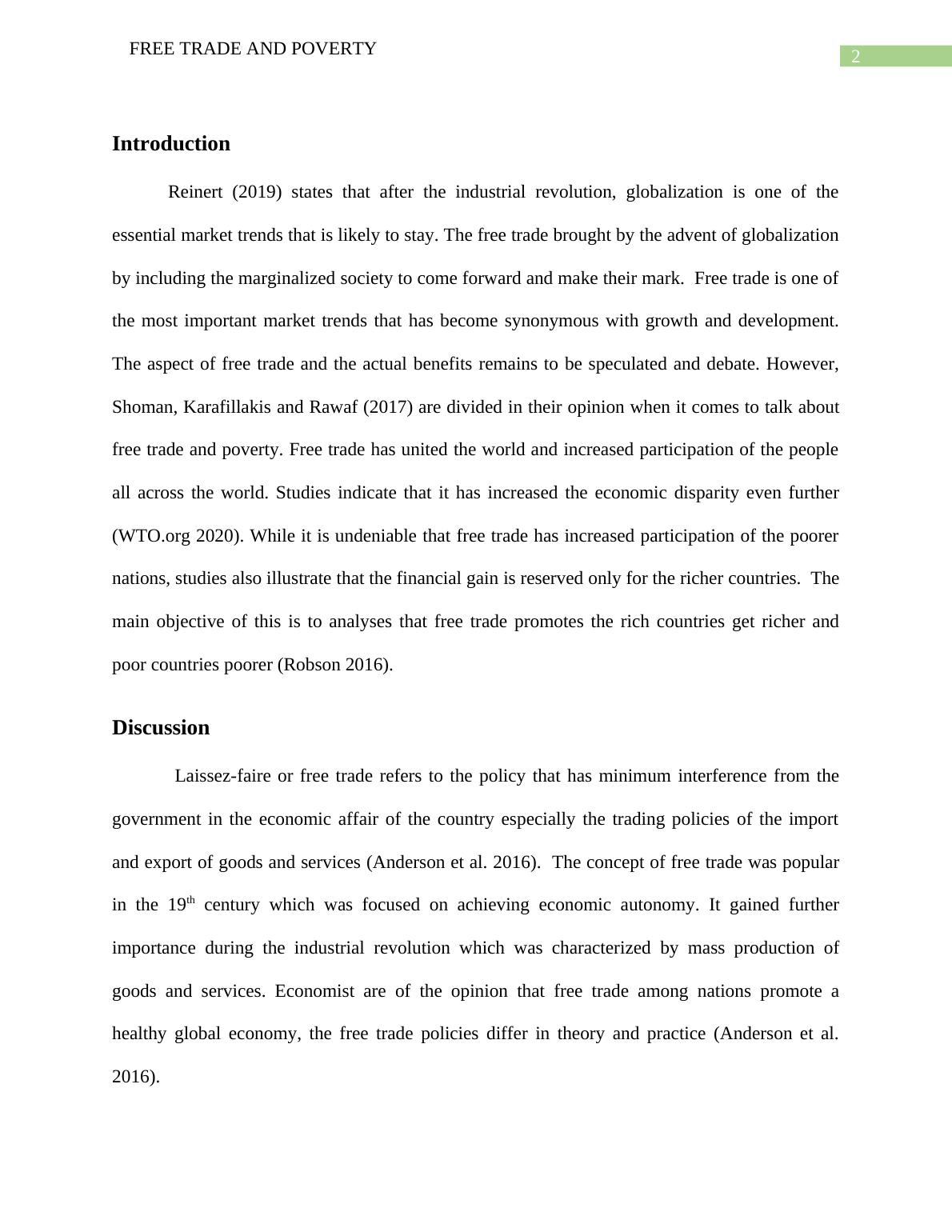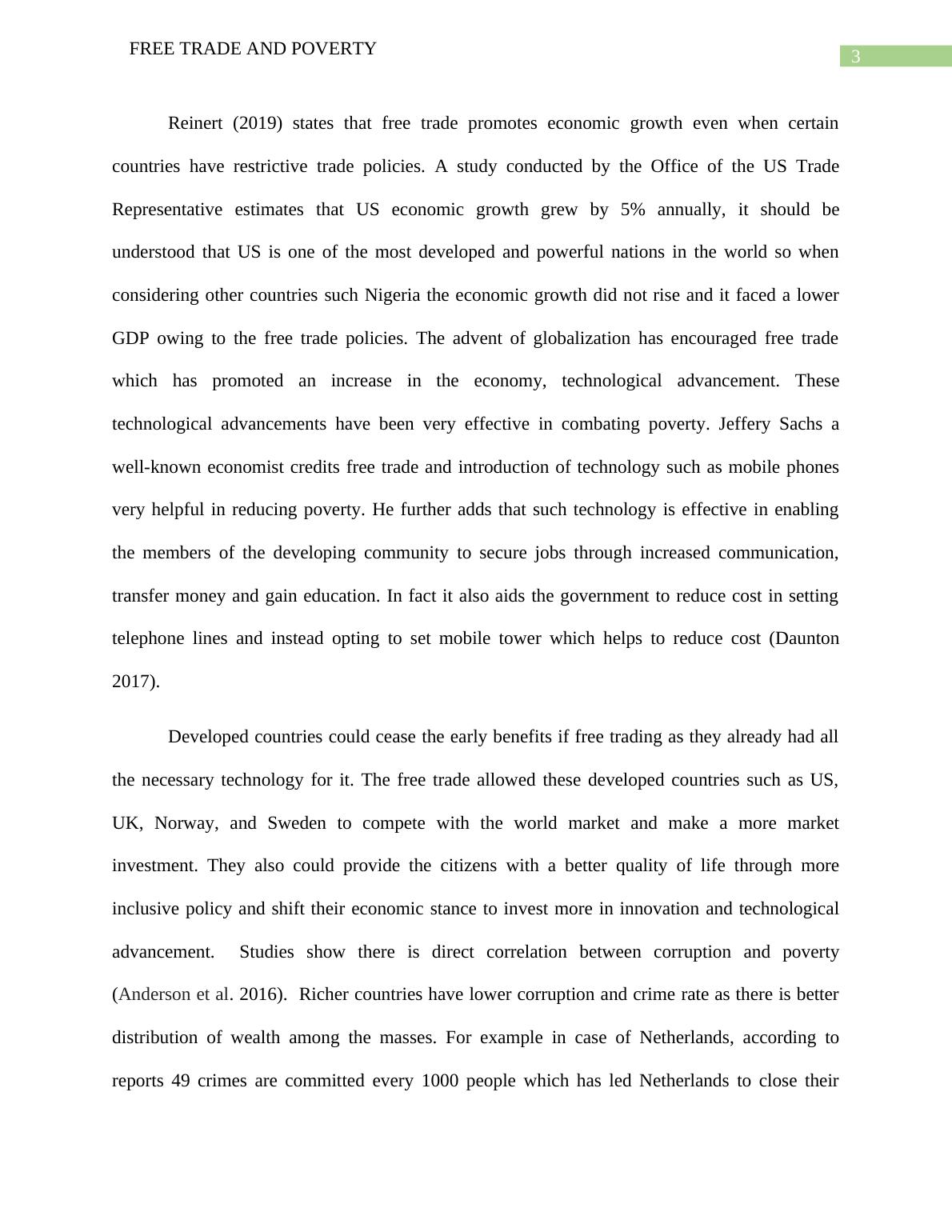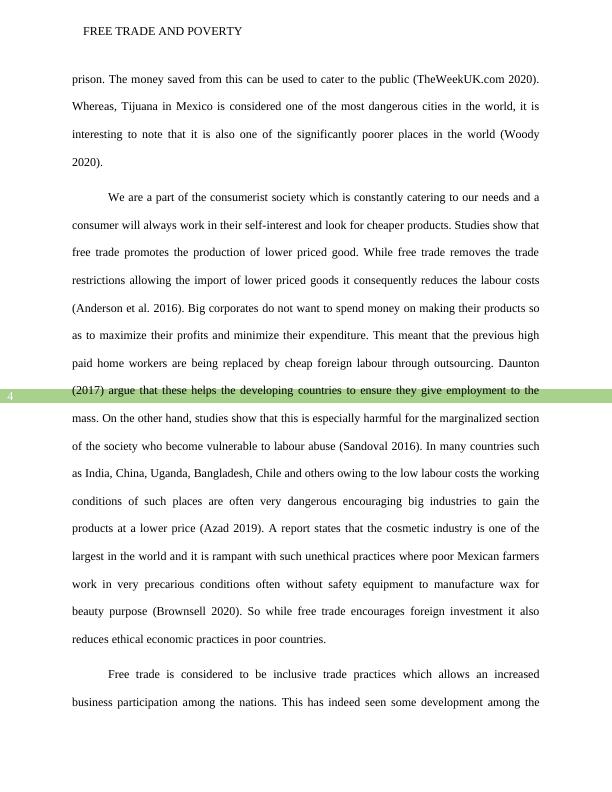THE FREE TRADE AND POVERTY
Added on 2022-08-08
11 Pages3269 Words22 Views
Running head: FREE TRADE AND POVERTY
FREE TRADE AND POVERTY
Name of the Student
Name of the University
Author Note
FREE TRADE AND POVERTY
Name of the Student
Name of the University
Author Note

FREE TRADE AND POVERTY
2
Introduction
Reinert (2019) states that after the industrial revolution, globalization is one of the
essential market trends that is likely to stay. The free trade brought by the advent of globalization
by including the marginalized society to come forward and make their mark. Free trade is one of
the most important market trends that has become synonymous with growth and development.
The aspect of free trade and the actual benefits remains to be speculated and debate. However,
Shoman, Karafillakis and Rawaf (2017) are divided in their opinion when it comes to talk about
free trade and poverty. Free trade has united the world and increased participation of the people
all across the world. Studies indicate that it has increased the economic disparity even further
(WTO.org 2020). While it is undeniable that free trade has increased participation of the poorer
nations, studies also illustrate that the financial gain is reserved only for the richer countries. The
main objective of this is to analyses that free trade promotes the rich countries get richer and
poor countries poorer (Robson 2016).
Discussion
Laissez-faire or free trade refers to the policy that has minimum interference from the
government in the economic affair of the country especially the trading policies of the import
and export of goods and services (Anderson et al. 2016). The concept of free trade was popular
in the 19th century which was focused on achieving economic autonomy. It gained further
importance during the industrial revolution which was characterized by mass production of
goods and services. Economist are of the opinion that free trade among nations promote a
healthy global economy, the free trade policies differ in theory and practice (Anderson et al.
2016).
2
Introduction
Reinert (2019) states that after the industrial revolution, globalization is one of the
essential market trends that is likely to stay. The free trade brought by the advent of globalization
by including the marginalized society to come forward and make their mark. Free trade is one of
the most important market trends that has become synonymous with growth and development.
The aspect of free trade and the actual benefits remains to be speculated and debate. However,
Shoman, Karafillakis and Rawaf (2017) are divided in their opinion when it comes to talk about
free trade and poverty. Free trade has united the world and increased participation of the people
all across the world. Studies indicate that it has increased the economic disparity even further
(WTO.org 2020). While it is undeniable that free trade has increased participation of the poorer
nations, studies also illustrate that the financial gain is reserved only for the richer countries. The
main objective of this is to analyses that free trade promotes the rich countries get richer and
poor countries poorer (Robson 2016).
Discussion
Laissez-faire or free trade refers to the policy that has minimum interference from the
government in the economic affair of the country especially the trading policies of the import
and export of goods and services (Anderson et al. 2016). The concept of free trade was popular
in the 19th century which was focused on achieving economic autonomy. It gained further
importance during the industrial revolution which was characterized by mass production of
goods and services. Economist are of the opinion that free trade among nations promote a
healthy global economy, the free trade policies differ in theory and practice (Anderson et al.
2016).

FREE TRADE AND POVERTY
3
Reinert (2019) states that free trade promotes economic growth even when certain
countries have restrictive trade policies. A study conducted by the Office of the US Trade
Representative estimates that US economic growth grew by 5% annually, it should be
understood that US is one of the most developed and powerful nations in the world so when
considering other countries such Nigeria the economic growth did not rise and it faced a lower
GDP owing to the free trade policies. The advent of globalization has encouraged free trade
which has promoted an increase in the economy, technological advancement. These
technological advancements have been very effective in combating poverty. Jeffery Sachs a
well-known economist credits free trade and introduction of technology such as mobile phones
very helpful in reducing poverty. He further adds that such technology is effective in enabling
the members of the developing community to secure jobs through increased communication,
transfer money and gain education. In fact it also aids the government to reduce cost in setting
telephone lines and instead opting to set mobile tower which helps to reduce cost (Daunton
2017).
Developed countries could cease the early benefits if free trading as they already had all
the necessary technology for it. The free trade allowed these developed countries such as US,
UK, Norway, and Sweden to compete with the world market and make a more market
investment. They also could provide the citizens with a better quality of life through more
inclusive policy and shift their economic stance to invest more in innovation and technological
advancement. Studies show there is direct correlation between corruption and poverty
(Anderson et al. 2016). Richer countries have lower corruption and crime rate as there is better
distribution of wealth among the masses. For example in case of Netherlands, according to
reports 49 crimes are committed every 1000 people which has led Netherlands to close their
3
Reinert (2019) states that free trade promotes economic growth even when certain
countries have restrictive trade policies. A study conducted by the Office of the US Trade
Representative estimates that US economic growth grew by 5% annually, it should be
understood that US is one of the most developed and powerful nations in the world so when
considering other countries such Nigeria the economic growth did not rise and it faced a lower
GDP owing to the free trade policies. The advent of globalization has encouraged free trade
which has promoted an increase in the economy, technological advancement. These
technological advancements have been very effective in combating poverty. Jeffery Sachs a
well-known economist credits free trade and introduction of technology such as mobile phones
very helpful in reducing poverty. He further adds that such technology is effective in enabling
the members of the developing community to secure jobs through increased communication,
transfer money and gain education. In fact it also aids the government to reduce cost in setting
telephone lines and instead opting to set mobile tower which helps to reduce cost (Daunton
2017).
Developed countries could cease the early benefits if free trading as they already had all
the necessary technology for it. The free trade allowed these developed countries such as US,
UK, Norway, and Sweden to compete with the world market and make a more market
investment. They also could provide the citizens with a better quality of life through more
inclusive policy and shift their economic stance to invest more in innovation and technological
advancement. Studies show there is direct correlation between corruption and poverty
(Anderson et al. 2016). Richer countries have lower corruption and crime rate as there is better
distribution of wealth among the masses. For example in case of Netherlands, according to
reports 49 crimes are committed every 1000 people which has led Netherlands to close their

FREE TRADE AND POVERTY
4
prison. The money saved from this can be used to cater to the public (TheWeekUK.com 2020).
Whereas, Tijuana in Mexico is considered one of the most dangerous cities in the world, it is
interesting to note that it is also one of the significantly poorer places in the world (Woody
2020).
We are a part of the consumerist society which is constantly catering to our needs and a
consumer will always work in their self-interest and look for cheaper products. Studies show that
free trade promotes the production of lower priced good. While free trade removes the trade
restrictions allowing the import of lower priced goods it consequently reduces the labour costs
(Anderson et al. 2016). Big corporates do not want to spend money on making their products so
as to maximize their profits and minimize their expenditure. This meant that the previous high
paid home workers are being replaced by cheap foreign labour through outsourcing. Daunton
(2017) argue that these helps the developing countries to ensure they give employment to the
mass. On the other hand, studies show that this is especially harmful for the marginalized section
of the society who become vulnerable to labour abuse (Sandoval 2016). In many countries such
as India, China, Uganda, Bangladesh, Chile and others owing to the low labour costs the working
conditions of such places are often very dangerous encouraging big industries to gain the
products at a lower price (Azad 2019). A report states that the cosmetic industry is one of the
largest in the world and it is rampant with such unethical practices where poor Mexican farmers
work in very precarious conditions often without safety equipment to manufacture wax for
beauty purpose (Brownsell 2020). So while free trade encourages foreign investment it also
reduces ethical economic practices in poor countries.
Free trade is considered to be inclusive trade practices which allows an increased
business participation among the nations. This has indeed seen some development among the
4
prison. The money saved from this can be used to cater to the public (TheWeekUK.com 2020).
Whereas, Tijuana in Mexico is considered one of the most dangerous cities in the world, it is
interesting to note that it is also one of the significantly poorer places in the world (Woody
2020).
We are a part of the consumerist society which is constantly catering to our needs and a
consumer will always work in their self-interest and look for cheaper products. Studies show that
free trade promotes the production of lower priced good. While free trade removes the trade
restrictions allowing the import of lower priced goods it consequently reduces the labour costs
(Anderson et al. 2016). Big corporates do not want to spend money on making their products so
as to maximize their profits and minimize their expenditure. This meant that the previous high
paid home workers are being replaced by cheap foreign labour through outsourcing. Daunton
(2017) argue that these helps the developing countries to ensure they give employment to the
mass. On the other hand, studies show that this is especially harmful for the marginalized section
of the society who become vulnerable to labour abuse (Sandoval 2016). In many countries such
as India, China, Uganda, Bangladesh, Chile and others owing to the low labour costs the working
conditions of such places are often very dangerous encouraging big industries to gain the
products at a lower price (Azad 2019). A report states that the cosmetic industry is one of the
largest in the world and it is rampant with such unethical practices where poor Mexican farmers
work in very precarious conditions often without safety equipment to manufacture wax for
beauty purpose (Brownsell 2020). So while free trade encourages foreign investment it also
reduces ethical economic practices in poor countries.
Free trade is considered to be inclusive trade practices which allows an increased
business participation among the nations. This has indeed seen some development among the

End of preview
Want to access all the pages? Upload your documents or become a member.
Related Documents
Unequal Distribution Of wto Benefits | Reportlg...
|3
|434
|18
Justice and change in a global world Assignmentlg...
|6
|1389
|32
Globalization Assignment | Impact on Mobile Application Venturelg...
|9
|2079
|26
Managing Across Cross-Cultural: Globalization and its Impactlg...
|6
|1524
|160
International Trade Contribution to Developmentlg...
|12
|3093
|12
Global Trade and Finance Australia 2022lg...
|8
|1711
|29
